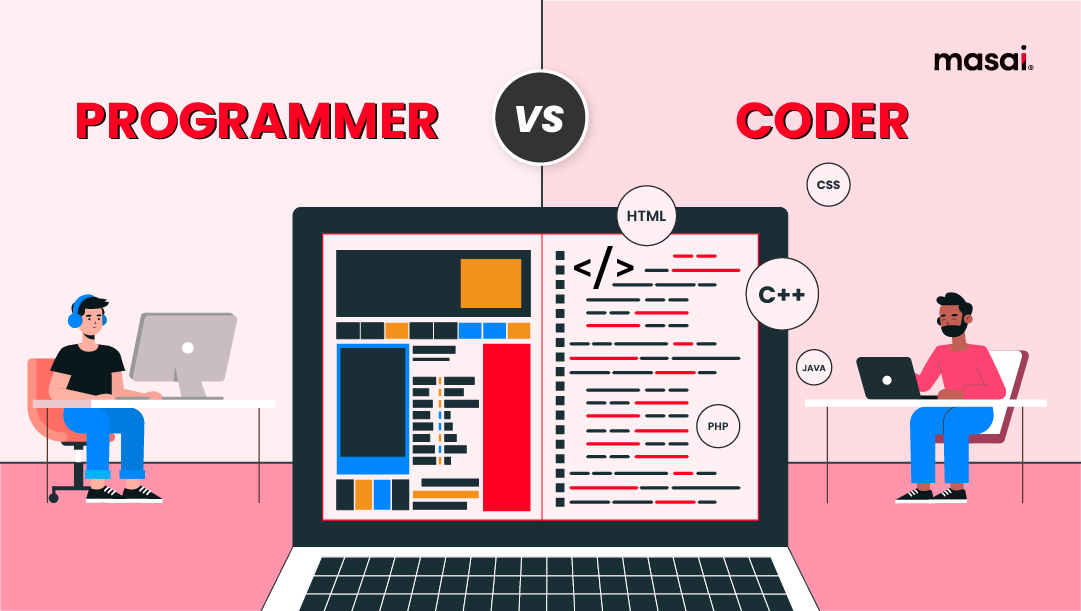Key Differences Between A Programmer & A Coder (A Comparative Study)
Programmer and Coder are two of the most common words used in tech. But, when it comes to differences between both terms, people are left with puzzled looks on their faces.

How old were you when you found out that the word “firm” could be used to describe something with a solid, almost unyielding surface or structure and a business concern involving a partnership of two or more people?
Let’s say you were a kid back then. What about the difference between colleges and universities?
You might never have bothered to figure out the difference. Not even when you went to apply for admissions just after passing out of school.
Well, you are not alone. People find themselves in similar situations in all walks of life and hence technology has not been spared.
Programmer and Coder are two of the most common words used in tech. But, when it comes to differences between both terms, people are left with puzzled looks on their faces.
This article will dive deep, clear the air between these terms, and later provide knowledge on how they work together.
Let’s begin.
Definition
Coder
As the name suggests, a coder has everything to do with code.
Lines of code in any programming language serve as the mode of communication between humans and machines.

The problem statement at hand is made available to coders in natural languages. The job of the coder here is to use their knowledge and convert it into a language understandable to the processors.
Code or at a more refined level, the coder, serves as the intermediary between what humans want and what the machine needs to do to produce the outcome desired by the humans in the first place.
Programmer
For the coders to write the lines of code to produce an outcome desired by humans, it is essential to have a problem statement at hand.
The problem statement is not something coders need to worry about.
It is the responsibility of a programmer to provide a problem statement.
And providing a coder with the problem statement is not the end-all, be-all of a programmer's existence. Programmers have to take up the burden of developing a product. This brings under his umbrella several important responsibility areas such as
- Research
- Design
- Testing
- Implementation, and
- Management
The coders come into existence at the testing or implementation stage in a programmer’s life.
This brings us to the myth-busting moment of this article- When people say programmers and coders are the same people, they are horribly wrong.
Coding is a subset of programming.
A programmer has to manage the end-to-end product development operations.

The coder’s role here is to help the programmer accelerate this process with his knowledge of programming languages. Coders take inputs from the programmer, write code and suggest improvements in case a need to do so arises.
Programmers can be thought of as our parents or family members who cook food for us every day.
Yes, they cook food daily. But they do not treat it as a daily task. Instead, before they decide to cook the food, they go about thinking a lot about what they want to make, what ingredients they want to use, and how they want to put them together.
Now that we have a fair bit of idea regarding the definition of a coder and programmer, let’s dive in and distinguish them on various parameters.
What are their daily activities and the tools required?
Writing tiny bits and pieces of code that solve the problem for the programmer forms the bulk of the day-to-day responsibilities of a coder. They are often required to change and write code from one language to another.
There aren't as many software tools needed to complete code. Practical knowledge of Integrated Development Environments (IDEs) such as NetBeans, Adobe Flash Builder, Eclipse, etc would suffice here.
Basic simple text editors like WordPad or Notepad can also be used to write code but they would have to turn to IDEs to check the output.
A coder’s day is thus focussed on the process directed towards an outcome.
On the other hand, a programmer’s day is mainly concerned with the outcome.
Before the code is written, a programmer has to make sure that there are systems in place that can help them attain the outcome faster.
They must know how to develop mathematical models and work with algorithms and in some cases gather and process data.
Once the code has been written, a programmer must analyse it and then pass it on for use in further processes. In case, any issues arise, programmers must find or suggest solutions to mitigate them. The programmer must be well-equipped to debug, compile, test, and implement an already-written code.
To do all of this, programmers should be able to wrap their heads around code analysis tools, databases, compilers, editors, debugging tools, and performance analysis tools.
A coder's daily routine primarily centers on the task of crafting and refining code snippets, serving as solutions to a wide array of programming challenges. This entails engaging with code in various languages and frequently necessitates the translation of code from one programming language into another to achieve the desired functionality. Summarily, the coder's day-to-day activities encompass the following:
Daily Activities of a Coder:
1. Writing Code: At its core, a coder's responsibility revolves around the composition of code segments aimed at addressing specific programming problems or tasks. This process entails not only writing but also modifying and optimizing code to ensure its proper and efficient functioning.
2. Code Review and Testing: Coders diligently review and rigorously test their code to identify and rectify errors, bugs, or any potential issues. This iterative procedure ensures that the code performs precisely as intended.
3. Utilizing Integrated Development Environments (IDEs): Coders harness the capabilities of Integrated Development Environments such as NetBeans, Adobe Flash Builder, Eclipse, and others to streamline code composition and debugging. These tools provide an all-encompassing environment for coding and testing.
4. Text Editors: While IDEs play a pivotal role, basic text editors like WordPad or Notepad may also find application in code composition. Nevertheless, coders frequently rely on IDEs for scrutinizing code outputs and simplifying the debugging process.
5. Problem-Solving: Coders allocate a substantial portion of their day to solving intricate programming problems. This demanding endeavor calls for logical thinking, creativity, and a profound comprehension of algorithms and data structures.
In contrast, a programmer's daily activities are more outcome-driven, emphasizing the creation of comprehensive solutions and systems. A programmer's typical day encompasses the following tasks:
Daily Activities of a Programmer:
System Design: Programmers begin their day by planning and designing systems that will facilitate the desired outcome. This includes developing architectural models, defining data structures, and creating flowcharts.
Algorithm Development: Programmers work on designing and refining mathematical models and algorithms. They devise strategies for efficient data processing and analysis.
Data Management: Gathering and processing data are essential tasks for programmers, especially in data-driven projects. They work with databases and data manipulation tools to extract valuable insights.
Code Implementation: Programmers write the code required to bring their system designs to life. This involves a deep understanding of coding languages, data integration, and software engineering principles.
Code Analysis: Programmers rigorously analyze the code they've written, ensuring it aligns with the system's requirements and objectives. This includes checking for errors, inefficiencies, and logical flaws.
Debugging and Testing: Debugging and testing are crucial phases in a programmer's day. They identify and rectify issues in the code, compile it, and thoroughly test it to ensure it functions correctly.
In summary, while coders focus on the process of writing and refining code to solve specific problems, programmers are concerned with the broader aspects of system design, algorithm development, data management, and the comprehensive implementation of solutions. Both roles are vital in the software development process, with coders ensuring that individual code components work seamlessly, while programmers oversee the creation of integrated, functional systems.
What should they know and the skills they should possess?
Coders are more likely to be found writing code on their system than carrying out water cooler conversations (until and unless they are on notice period).
Writing code that tells the computer what to do is the primary responsibility of programmers. Coders primarily concentrate on putting the programmer's ideas into practice.
Thus they are required to have in-depth knowledge of programming languages.
Making analytical decisions, updating programmes based on new information, coming up with abstract solutions, and anticipating issues are all part of programming. All of these are complex cognitive tasks.
With data gaining prominence, brownie points are on offer for coders to have a basic understanding of data gathering and processing.
When we peek into the life of programmers, it can be quickly concluded that they are required to possess more knowledge as compared to coders.
They must know how the process of developing and writing algorithms, designing websites, debugging, managing projects, and of course application of different programming languages.
Programmers are also expected to have analytical skills, critical thinking skills, and problem-solving skills when they are developing complex systems or processes that get the work done faster.
How are they expected to execute their job responsibilities?
As a programmer, it typically takes a few weeks to a few months to reach your goal. It is possible to write code without any prior preparation and to complete a straightforward solution in a few hours. It frequently advances through trial and error.
For a coder, the process of writing code sounds daunting and we know it is.
Coders might be able to write code that solves a problem within hours or a few days. Programmers, however, need a week or even more, sometimes months to deliver on their expectations- a website, application, or software product.

This brings to light the fact that programmers require more involvement in processes other than coding.
What are their Job Prospects and salaries?
According to the Bureau of Labor Statistics, computer and information technology jobs are expected to grow by 15% between 2021 and 2031, while requirements for all other positions are expected to grow by 5% during that time (BLS).[1]
The job outlook for many programming positions will be better than that of other occupations, according to the BLS. For instance, the BLS forecasts a 36% increase in job growth for data scientists between 2021 and 2031. [2]
As we have seen the responsibilities of a programmer exceed that of a coder by a fair amount and as such they get paid more than a coder.
The bell curve distribution shown above brings in a larger portion of coders in the salary range of 3-6.5 LPA.
On the other hand, when we take a look at the data for programmers the bell curve distribution does not have a bulge that is thick.
It gets denser around the 6.5 LPA mark. Not a lot can be drawn out of the salary comparison here. Although it might seem easier on the part of a programmer to ascertain their day-to-day life, the story is completely different when we look into their job responsibilities.
It is obvious from the comparative study that both programming and coding are crucial for product development. Both concepts are related to one another.
Programmers can declare their interest in logic, and perfect coders can be those who are good at remembering and comprehending information. Whether you want to become a programmer or a coder depends solely on your interests.
Select and become the one you enjoy exploring.
References:
[1] https://www.bls.gov/ooh/computer-and-information-technology/software-developers.htm
[2] https://www.bls.gov/ooh/math/data-scientists.htm
More resources on programming and coding-

